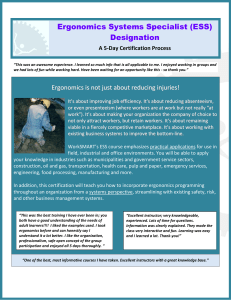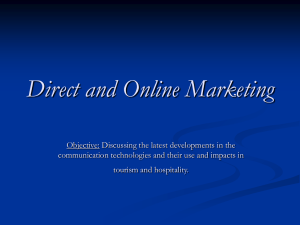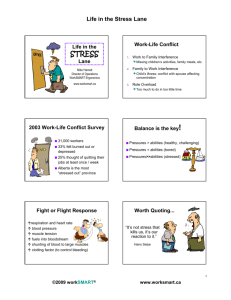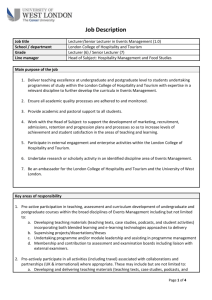Ergonomics for the Hospitality and Tourism Industy
advertisement
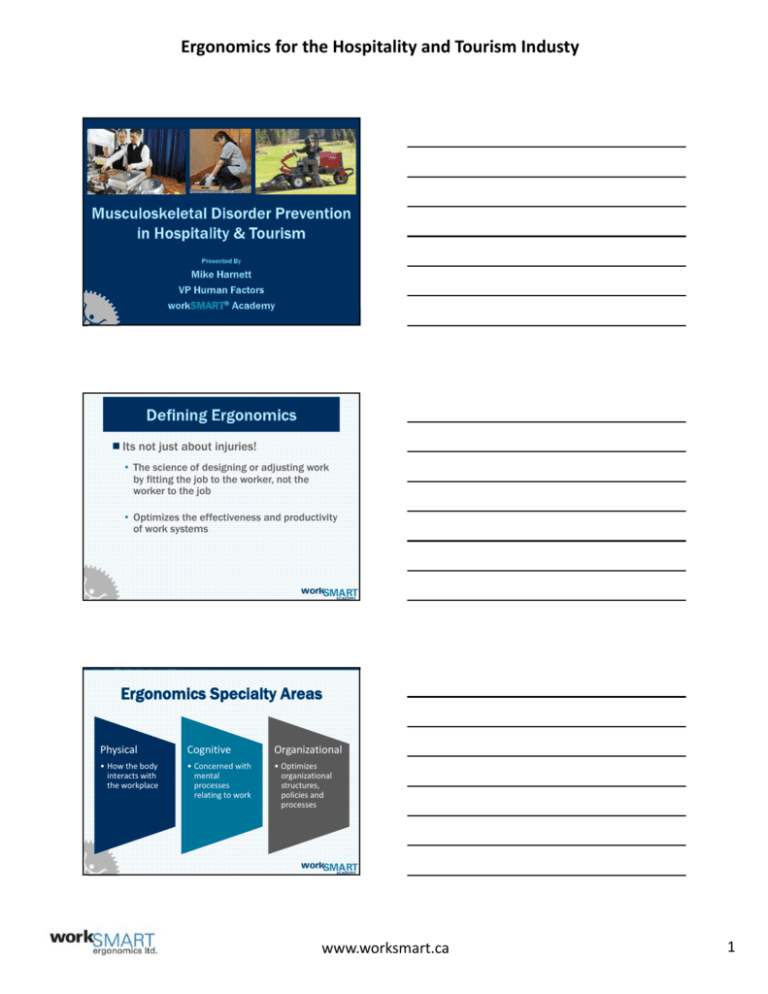
Ergonomics for the Hospitality and Tourism Industy Its not just about injuries! • The science of designing or adjusting work by fitting the job to the worker, not the worker to the job • Optimizes the effectiveness and productivity of work systems Physical Cognitive Organizational • How the body interacts with the workplace • Concerned with mental processes relating to work • Optimizes organizational structures, policies and processes www.worksmart.ca 1 Ergonomics for the Hospitality and Tourism Industy Tissue Threshold Work Demands Musculoskeletal Disorder – represent injuries or conditions that develop over repeated exposure to hazards (cumulative) Musculoskeletal Injury – includes all disorders plus acute injuries such as those attributed to slips/trips/falls, crushes, lacerations, etc. • • • • • Bones Joints Muscles Ligaments Tendons • • • • • Cartilage Bursas Blood Vessels Nerves Discs www.worksmart.ca 2 Ergonomics for the Hospitality and Tourism Industy Medical Costs Compensation DIRECT COSTS Down time Overhead $ while work Efficiency due to breakup crew disrupted Breaking in substitute INDIRECT COSTS Supervisor time to investigate Loss of production Failure to meet deadlines Overtime to make up Loss of good will production Damaged equipment Lost time by fellow workers Hiring costs Average cost per claim in BC based on 2007-2011 WCB direct costs Average Direct Cost of Injury $6700 (Back Injury) $9000 (Other Strains) $14,000 (Tendinitis) Indirect Costs X X X 4 = $26,800 7 = $46,900 4 = $36,000 7 = $63,000 4 = $70,000 7 = $112000 Total Cost Per Injury $33,500 ‐ $53,600 $45,000 ‐ $72,000 $84,000 ‐ $126,000 www.worksmart.ca 3 Ergonomics for the Hospitality and Tourism Industy Discs are the shock absorbers of the spine Bulges and herniations occur when bending, sitting • Don’t feel pain until damage reaches outer edges of the disc • Can trigger spasms or “back attacks” Overuse of muscle or tendon tissue resulting in micro-tearing Can develop… • Quickly, as a result of sudden extreme stress (e.g. lifting 75lb item); or • Slowly, and build up over time as a result of repeated or sustained smaller stresses (e.g. lifting 10lb item) Activities that increase disc compression and cause microtrauma to muscles www.worksmart.ca 4 Ergonomics for the Hospitality and Tourism Industy Overstretching or tearing of joint stabilizers Commonly a result of awkward postures and twisting Activities that cause microtrauma to ligaments What do these injuries have in common? Tendonitis Tenosynovitis Epicondylitis Bursitis www.worksmart.ca 5 Ergonomics for the Hospitality and Tourism Industy Activities that cause microtrauma to tendons and bursae Can be compressed, irritated or overstretched during awkward or static postures Typically feel burning, tingling, or radiating pain Referred to as the “Syndrome” injuries Carpal tunnel syndrome Raynaud’s syndrome Thoracic Outlet Syndrome www.worksmart.ca 6 Ergonomics for the Hospitality and Tourism Industy Activities that cause microtrauma to nerves or blood vessels Aching or fatigue at during working hours only Symptoms disappear with rest (overnight or on days off) No effects on performance No physical signs Can persist for weeks or months (reversible) Symptoms start earlier and last longer Symptoms may affect sleep Performance started to be affected (especially repetitive work) Physical signs may be present Loss of function may persist for months www.worksmart.ca 7 Ergonomics for the Hospitality and Tourism Industy Symptoms persist at rest Pain with non-repetitive movements Sleep disturbance common Unable to perform light efforts Visible signs often present Condition may last months to years and full recovery may not occur Precursor to the development of an injury A result of inadequate blood supply to transport oxygen to the muscle tissue during work If we can control fatigue, we can control most MSDs Find the hazards that lead to fatigue Gas Spark Air Energy Exhaust Heat Glucose Blood Oxygen Energy Lactic Acid Heat (Washington L&I) www.worksmart.ca 8 Ergonomics for the Hospitality and Tourism Industy Physical Hazards Personal Factors Organizational Hazards Forceful Gripping Lifting Lowering Carrying www.worksmart.ca 9 Ergonomics for the Hospitality and Tourism Industy Forceful Pushing, Pulling Awkward Postures Static Postures Repetitive Actions www.worksmart.ca 10 Ergonomics for the Hospitality and Tourism Industy The organization of work (How work is to be done) The organization’s culture (Psychosocial influences from the work environment) www.worksmart.ca 11 Ergonomics for the Hospitality and Tourism Industy Elevate the worker or lower the object Tilt work surfaces Use tool extenders Box re-positioned on side Tilted Laundry Bins Spring Loaded Cart Easier and safer dispensing of product Easier cleaning of pots or kettles www.worksmart.ca 12 Ergonomics for the Hospitality and Tourism Industy Use elevated faucet or hose to fill large pots and reduce lifting / carrying Use ladles or small sauce pans to empty liquids, soups, etc. from larger pots Use false bottom or plastic basin in the bottom of sink to raise work surface Place a false bottom (styrofoam blocks or cardboard box) in container to prevent overfilling Avoid pushing down on contents of bag to fit more garbage in (less air, more suction) Use barrels designed with lift vents or drill holes in the sides or bottom of the container Heavy items stored in power zone (between knees and chest) Use flow racks and roller racks www.worksmart.ca 13 Ergonomics for the Hospitality and Tourism Industy Avoid • single and dual finger activations; extend handle to allow whole hand activation • replace grips with ridges; • grips that force wrists into non-neutral positions; reposition control mechanism or rotate handle Use lightweight telescopic handles with adjustable angle heads Consider dusting gloves for dusting of objects to reduce gripping of cloth www.worksmart.ca 14 Ergonomics for the Hospitality and Tourism Industy Low impact control (but still necessary) Organizations needs to recognize that lifting is a skill and not everyone has the skills! www.worksmart.ca 1-888-932-7955 info@worksmart.ca mharnett@worksmart.ca www.worksmart.ca 15
